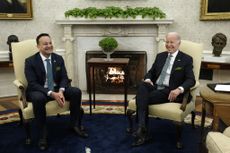‘The winter of discontent should serve as a warning to Boris Johnson’
Your digest of analysis and commentary from the British and international press

- 1. Beware, Boris: Britain is hurtling towards a winter of discontent
- 2. Why ‘the Biden doctrine’ on foreign policy is here to stay
- 3. The PM has ‘full confidence’ in his foreign secretary – but that doesn’t mean accountability is dead
- 4. Britain needs to find a better role for its former prime ministers
- 5. Britain’s cancer survival rates risk going backwards
1. Beware, Boris: Britain is hurtling towards a winter of discontent
Liam Halligan in The Telegraph
Britain's turning point
“September represents new beginnings, a time to consider what lies ahead – for the government and the UK as a whole”, writes Liam Halligan in The Telegraph. “It strikes me that Britain, both economically and politically, is at a turning point not dissimilar to the mid-1970s”, he notes. And that time of “chronic uncertainty” culminated in the 1978/79 “winter of discontent” writes Halligan, where a “combination of soaring prices, intensifying strike action and a breakdown of vital public services sparked a radical political reset, embodied by Margaret Thatcher.” Of course, there are “key differences” between then and now – but “the similarities are eerie and should serve as a warning to the Prime Minister of just how quickly the economic and political tide can shift and the electorate’s patience can snap.”
Subscribe to The Week
Escape your echo chamber. Get the facts behind the news, plus analysis from multiple perspectives.

Sign up for The Week's Free Newsletters
From our morning news briefing to a weekly Good News Newsletter, get the best of The Week delivered directly to your inbox.
From our morning news briefing to a weekly Good News Newsletter, get the best of The Week delivered directly to your inbox.
2. Why ‘the Biden doctrine’ on foreign policy is here to stay
Stephen Bush in the New Statesman
on a new era
“How important was the speech Joe Biden gave last night?” asks Stephen Bush in the New Statesman. “The headline-grabbing parts are his defence of the US’s withdrawal from Afghanistan”, yet the key part of his statement was about his intention to end major military operations to “‘remake other countries’”. “Whatever happens to Biden politically, what you might call ‘the Biden doctrine’ on American foreign policy will almost certainly be more enduring – and that reality is something that all politicians in the democratic world will have to adjust their own foreign policy to.”
3. The PM has ‘full confidence’ in his foreign secretary – but that doesn’t mean accountability is dead
John Rentoul in The Independent
on ministerial resignations
“I doubt that Raab will be moved in the next reshuffle unless other things go wrong,” writes John Rentoul in The Independent. “Being on a beach during an international crisis looked bad, but it is hardly the worst thing a minister has done,” he says. And that doesn’t mean that that “political accountability is dead.” Indeed, “[t]he idea that ministers used to resign with honour but now cling to office despite being bang to rights is refuted by a list of ministerial resignations compiled by Whitehall Monitor,” he continues. In the end, “accountability comes via public opinion”, Rentoul says. The reason Matt Hancock, for example, had to go “is that it would have been disastrous for the government to have kept a law-maker who was a law-breaker. And the reason Raab can stay is that public opinion is largely unmoved.”
4. Britain needs to find a better role for its former prime ministers
Sebastian Payne in the Financial Times
on lost expertise
Theresa May is “the only living former UK prime minister still in parliament,” notes Sebastian Payne in the Financial Times. The remaining four have “left the political stage, declining a customary pew in the House of Lords.” While “[t]he honourable reason for quitting the Commons after leaving Number 10 is to avoid undermining one’s successor”, it seems “most former PMs really leave for money. Having enjoyed the gilded Downing Street existence of chauffeurs and private jets, few embrace a return to normal life.” Our ex-MPs should be persuaded to stay on in some form, argues Payne: one can “imagine how much richer the debate over Brexit would have been if Blair, Brown and Cameron had been present on the green benches.” Indeed, “British politics is sorely missing leaders with wisdom and expertise. Our ex-PMs have both.”
5. Britain’s cancer survival rates risk going backwards
Charles Swanton in The Times
on the waiting-list crisis
“Once again, ahead of the spending review, the health sector and its allies are lining up to make the case for more money. But this autumn will be different. For the first time in years, the government is expected to set out its spending for a longer period: the next three years,” writes Charles Swanton in The Times. “This is a huge opportunity to fix chronic problems of the NHS, particularly in workforce and infrastructure, drive innovations and address persistent inequalities in care,” he continues. But the challenges facing the NHS “pre-date the pandemic”, he notes. Dispiritingly, “the last time the NHS met its two-month cancer waiting time target was in 2015” and “[b]y the time Covid arrived, this statistic was the worst on record”. “We now risk a crisis, with cancer survival potentially declining,” writes Swanton. “But with political will and targeted investment this can be avoided.”
Create an account with the same email registered to your subscription to unlock access.
Sign up for Today's Best Articles in your inbox
A free daily email with the biggest news stories of the day – and the best features from TheWeek.com
-
 Nigeria's worsening rate of maternal mortality
Nigeria's worsening rate of maternal mortalityUnder the radar Economic crisis is making hospitals unaffordable, with women increasingly not receiving the care they need
By Harriet Marsden, The Week UK Published
-
 'Elevating Earth Day into a national holiday is not radical — it's practical'
'Elevating Earth Day into a national holiday is not radical — it's practical'Instant Opinion Opinion, comment and editorials of the day
By Harold Maass, The Week US Published
-
 UAW scores historic win in South at VW plant
UAW scores historic win in South at VW plantSpeed Read Volkswagen workers in Tennessee have voted to join the United Auto Workers union
By Peter Weber, The Week US Published
-
 10 things you need to know today: January 7, 2024
10 things you need to know today: January 7, 2024Daily Briefing White House reportedly left unaware of defense secretary’s hospitalization, Biden to deliver State of the Union address on March 7, and more
By Justin Klawans, The Week US Published
-
 10 things you need to know today: September 5, 2023
10 things you need to know today: September 5, 2023Daily Briefing President Biden courts unions on Labor Day, thousands leave Burning Man after being trapped by desert mud, and more
By Harold Maass Published
-
 Captain Tom charity closes to donations amid daughter’s pool row
Captain Tom charity closes to donations amid daughter’s pool rowSpeed Read Hannah Ingram-Moore to appeal council order to demolish spa complex at her home
By Arion McNicoll Published
-
 Boris Johnson shocks UK by resigning from Parliament
Boris Johnson shocks UK by resigning from ParliamentSpeed Read
By Justin Klawans Published
-
 Bees delay flight for three hours
Bees delay flight for three hoursfeature And other stories from the stranger side of life
By Chas Newkey-Burden Published
-
 Sudan evacuation: has Foreign Office learnt the lessons from Afghanistan?
Sudan evacuation: has Foreign Office learnt the lessons from Afghanistan?Today's Big Question Failings of chaotic withdrawal from Kabul prompt return of foreign secretary and airlift of Britons from Khartoum
By The Week Staff Last updated
-
 10 things you need to know today: March 18, 2023
10 things you need to know today: March 18, 2023Daily Briefing Trump says he expects to be arrested Tuesday in Manhattan, Biden hosts Irish Taoiseach at White House for St. Patrick’s Day, and more
By Justin Klawans Published
-
 10 things you need to know today: February 11, 2023
10 things you need to know today: February 11, 2023Daily Briefing U.S. shoots down object flying off Alaska coast, Trump team has reportedly turned over more classified documents and laptop, and more
By Justin Klawans Published